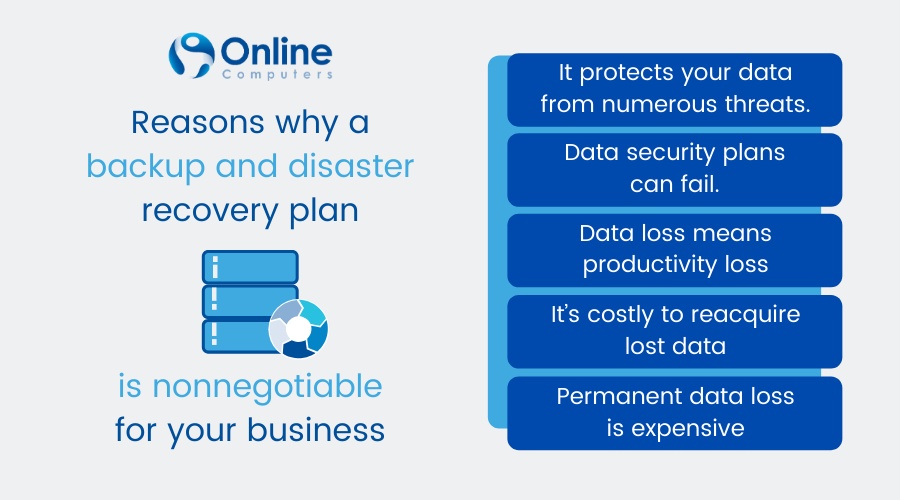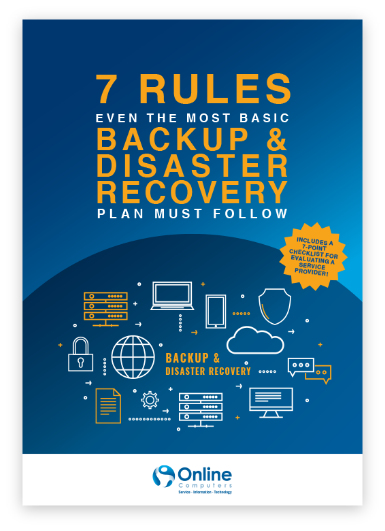No matter how meticulous you plan and execute your business strategy, you have no control over many extraneous variables. So to mitigate or minimize any negative effects of events beyond your control, you need a solid data backup and recovery plan as part of your overall business strategy.
A perfect example is the COVID-19 pandemic. No business owner would have predicted that a virus that originated from halfway across the world would affect so many businesses in Hanover, Morristown, Madison, and the other towns and counties of New Jersey. Certain businesses deemed essential are allowed to operate; others have been forced to operate from home. This major disruption and change in working conditions is rife with potential data threats.
Why is data backup and recovery important for business?
Today’s businesses rely on technology and data to be competitive. Imagine what would happen to your business should a natural calamity or an unscrupulous hacker cost you all your company data.
Significant loss of important data will lead to costly downtime and, in some cases, permanent closure of business.
Here are other reasons why a backup and disaster recovery plan is nonnegotiable for your business:
- It protects your data from numerous threats. Your data is vulnerable to physical damage, technical malfunction, human error or malice, and natural disasters. With so many potential threats, you cannot just rely on protecting your data because…
- …Data security plans can fail. No technology is foolproof. Even the best data protection measures can fail, given all the threats it faces. That’s why you need backups.
- Data loss means productivity loss. Business operations rely on data. Without it, your operations will suffer. Work productivity will take a dive. And the longer data remains unavailable, the greater the negative impact on your business.
- It’s costly to reacquire lost data. Recovering or reacquiring your data is expensive. But if you have a data backup and recovery plan, you’ll be able to reduce the scope of damage.
- Permanent data loss is expensive. Add to this list the reputational damage that your company will suffer. A serious blow to your reputation is fatal because no one will want to do business with a company that cannot protect its data.
Don't make the same mistakes others made!
There’s a lot that goes into designing a BDR plan. Our informative free eBook: 7 Rules even the most basic backup & disaster recovery plan must follow can walk you through the entire process of setting up a reliable strategy.
What are the latest backup and recovery trends?
Over the past few years, technology developments have altered the backup and recovery landscape. Better cloud technology and data storage solutions are now available for businesses, providing better data security.
Here are the trends in data backup and recovery to look out for:
- Disaster-Recovery-as-a-Service (DRaaS) ‒ Disaster recovery can be quite expensive if done in-house, so businesses are now partnering with managed IT services providers (MSPs) to look after their data recovery should the unthinkable happen.
- Automation in the cloud ‒ Say goodbye to manual processes and the use of physical media storage for backup. With automation in the cloud, data backup becomes automatic, secure, and free of human error. Because of cloud-based servers' geo-redundant features, data can be saved on multiple locations around the world. If a file cannot be retrieved from a certain server, the cloud can try another location, making recovery easier than ever.
- Progressive data protection ‒ Data protection doesn't simply mean having one separate backup. More businesses are now relying on secondary storage, data replicas, and data snapshots to guarantee the safety of their business data. What’s more, firms can use the secondary data for DevOps (development and operations) and testing.
- Internet of Things (IoT) ‒ With IoT, businesses will be able to generate and collect large amounts of data. This will impact companies in a huge way, so businesses need to adapt their networks and systems for this new reality.
- Big data and machine learning ‒ With immense amounts of data available, there’s a growing need for artificial intelligence (AI) for faster data management. Applying big data and AI makes data management and data backup more efficient, reliable, and secure.
- Holistic approach to data protection and disaster recovery ‒ Before, these two were seen as separate specialties. Data protection meant having backups, while data recovery focused on being up and running immediately after downtime. Today, data backup service providers view backup and restoration as one seamless operation. The whole process can be automated in the cloud, leading to faster recovery.
Be forward-looking with your data protection, backup, and recovery plan by partnering with Online Computers. Our IT experts will help you stay competitive, provide you with cutting-edge technology, and assist you with your backup and data recovery plans. Our team of over 50 professionals are dedicated to giving you responsive service 24/7. Entrust your technology and business into our capable hands. Call us today to know how we can help you.






